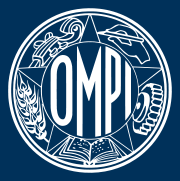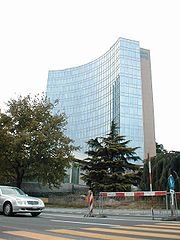- World Intellectual Property Organisation
-
Die Weltorganisation für geistiges Eigentum (engl. World Intellectual Property Organization, WIPO; französisch Organisation mondiale de la propriété intellectuelle, OMPI) wurde 1967 mit dem Ziel gegründet, Rechte an immateriellen Gütern weltweit zu fördern. 1974 wurde die WIPO Teilorganisation der Vereinten Nationen. Die WIPO ist Ausgangspunkt des Zusammenarbeitsvertrags (PCT) von 1970, des WIPO-Urheberrechtsvertrags von 1996 und des Patentgesetzvertrags (engl. Patent Law Treaty) von 2000.
Inhaltsverzeichnis
Arbeit
Die WIPO ist zum einen eine diplomatische Konferenz der Mitglieder, zum anderen eine Organisation mit Exekutivfunktion, die u.a. die PCT-Anmeldungen verwaltet. Streitfälle werden durch Mediation und Schiedsgericht geschlichtet. Ferner berät die WIPO auf Anforderung von offiziellen Interessenvertretern bei der Gesetzgebung im Feld des geistigen Eigentums. Vor allem die Flexibilisierung des TRIPs-Abkommens ist ein Thema dabei. Das TRIPs-Abkommen wurde außerhalb der WIPO durch das Freihandelssystem GATT ausgehandelt. Damit wurde die WIPO institutionell brüskiert und versucht ihren Einfluss zurück zu gewinnen. 2005 wurde auf Drängen zahlreicher Mitglieder aus der Dritten Welt eine entwicklungspolitische Agenda unter heftigem diplomatischen Widerstand der Vereinigten Staaten besprochen. Auch der Schutz traditionellen Wissens rückt in den Fokus der Weltorganisation. Es ist jedoch fraglich, ob die Einforderung eines solchen Schutzes mehr ist als ein diplomatischer Schachzug von Entwicklungsländern.
Kritik
Die WIPO wird von einigen Kritikern als eine der Triebkräfte für eine Bevorrechtigung von Inhabern immaterieller Monopolrechte angesehen. Die Kritik kommt häufig aus dem globalisierungskritischen Umfeld.
Die Industrieländer andererseits kritisieren, dass die WIPO Entwicklungsländern gleiche Stimmrechte gibt. Deshalb wurde ein Forenwechsel mit dem TRIPS-Vertrag zum GATT bzw. zur WTO vollzogen. Dort ist die Thematik aber heftig umstritten. Der Ökonom Jagdish Bhagwati sieht in der Öffnung des GATT für andere Themen einen historischen Fehler.
Eine im Jahr 2003 angesetzte Konferenz zu freier Software wurde durch Intervention der US-amerikanischen WIPO-Vertreter abgesetzt, wobei ein Einfluss der amerikanischen Softwareindustrie angenommen werden darf [1]. Der Einfluss von Befürwortern geistiger Eigentumsrechte auf eine ursprünglich als neutral gegründete Organisation wurde damit öffentlich.
von der WIPO verwaltete Verträge
Die Wipo verwaltet 24 Verträge 2008. Im Gegensatz zu anderen UN-Organisationen, insbesondere der WTO, sind Mitglieder nicht verpflichtet, alle Verträge anzunehmen.
- Berner Übereinkunft zum Schutz von Werken der Literatur und Kunst (RBÜ)
- Madrider Abkommen über die internationale Registrierung von Marken (MMA)
- Protokoll zum Madrider Abkommen über die internationale Registrierung von Marken (PMMA)
- Markenrechtsvertrag (Trademark Law Treaty TLT)
- Vertrag über die Internationale Zusammenarbeit auf dem Gebiet des Patentwesens (PCT)
- WIPO-Urheberrechtsvertrag (WCT)
- Locarno-Klassifikation
- Haager Abkommen über die internationale Hinterlegung gewerblicher Muster und Modelle (HMA)
Siehe auch
- Übereinkommen über handelsbezogene Aspekte der Rechte des geistigen Eigentums (TRIPS) (wird von der WTO verwaltet)
- Markenrecht
- Patentrecht
- Urheberrecht
- Patentamt
Literatur
- Ingo E. Niemann: Das Verhältnis zwischen WTO/TRIPS und WIPO. Geistiges Eigentum in konkurrierenden völkerrechtlichen Vertragsordnungen.,Springer-Verlag, Berlin 2007, ISBN 3540753486.
Weblinks
- Website der WIPO
- WIPO: Gründung, Ziele, Strukturen, Aktivitäten (GlobalDefence.net)
- Die „Foundation for a Free Information Infrastructure“ (FFII) zu Softwarepatenten
- WIPO setzt sich für Rückgabe der abgelaufenen IFPI Domain ein
Quellen
Wikimedia Foundation.


